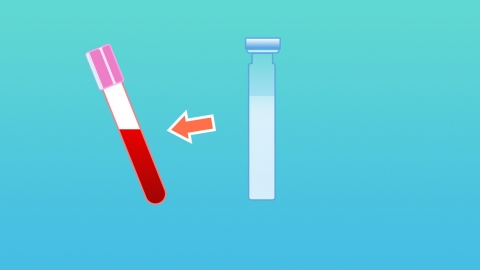What causes low hematocrit levels and what should be done?
Generally, low hematocrit levels may be caused by excessive water intake diluting the blood, long-term dieting leading to nutritional deficiencies, iron deficiency anemia, megaloblastic anemia, gastric ulcers, and other factors. It is recommended to seek timely medical consultation, identify the underlying cause, and improve the condition through lifestyle adjustments, medication, and other methods under a doctor's guidance. Detailed explanations are as follows:

1. Excessive water intake diluting the blood: Drinking large amounts of water in a short period increases blood water content, causing a relative decrease in red blood cell concentration, which leads to low hematocrit. This condition typically causes no significant discomfort. Reducing water intake within a short time frame and resuming normal hydration habits, while avoiding drinking more than 500 ml of water at once, can usually normalize the indicators after 1-2 days of retesting.
2. Long-term dieting and nutritional deficiency: Prolonged dieting can lead to insufficient intake of iron, protein, vitamin B12, and other essential components required for red blood cell production, thereby affecting red blood cell generation and causing low hematocrit, accompanied by fatigue and pale complexion. Stop dieting, resume a balanced diet, and consume more iron- and protein-rich foods such as lean meat, animal liver, and eggs. Nutritional supplements may be needed as directed by a physician.
3. Iron deficiency anemia: Insufficient iron intake or impaired absorption can reduce red blood cell production, leading to low hematocrit, accompanied by dizziness, palpitations, and brittle nails. Patients should take iron supplements such as ferrous succinate tablets, ferrous fumarate granules, or ferrous sulfate sustained-release tablets as directed by a physician.
4. Megaloblastic anemia: Deficiency in vitamin B12 or folic acid can impair red blood cell maturation, resulting in low hematocrit, accompanied by numbness in hands and feet and loss of appetite. Patients should take supplements such as vitamin B12 tablets, folic acid tablets, or mecobalamin tablets as directed by a physician to replenish the deficient nutrients.
5. Gastric ulcer: Stimulation of the gastric mucosa by stomach acid and Helicobacter pylori can lead to ulcer formation. Vascular rupture at the ulcer site causes chronic bleeding, and long-term blood loss leads to excessive red blood cell loss, resulting in low hematocrit, accompanied by postprandial stomach pain and black stools. Patients should take medications such as omeprazole enteric-coated capsules, colloidal bismuth potassium citrate capsules, and amoxicillin capsules as directed by a physician to suppress gastric acid secretion, protect the gastric mucosa, and eradicate Helicobacter pylori.
In daily life, maintaining a regular routine, avoiding excessive fatigue, and engaging in appropriate mild exercise to enhance physical fitness are recommended. Avoid excessive picky eating, ensure comprehensive nutrient intake, and refrain from consuming spicy or excessively hot foods that may irritate the gastric mucosa.







